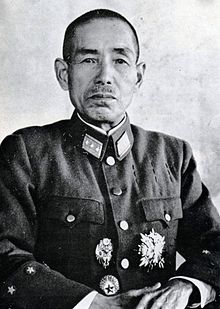Hata Shunroku
Hata Shunroku ( Japanese 畑 俊 六 ; * July 26, 1879 ; † May 10, 1962 ) was Japanese Minister of the Army and Field Marshal General ( Gensui ) in World War II .
Hata graduated from the Army Officers School in the twelfth year. In 1933, Hata became the commander of the 14th Division of the Imperial Japanese Army and was dispatched to the first Shanghai Incident in 1932 . On his return he was, among other things, chief of the aviation headquarters , then commander of the Japanese troops in Taiwan (1936) and inspector general of military training (1937).
In 1937, Hata was promoted to general and in February 1938 was appointed commander-in-chief of the newly formed Central China Expeditionary Army. As such, he led the army's operations against Xuzhou and the operation against Wuhan from June to October 1938. Hata was subordinate to the 11th Army ( Okamura ) and the 2nd Army ( Higashikuni ), which was under his command in July 1938 .
In 1939, Hata was appointed to Abe Nobuyuki's cabinet as Minister of the Army. He also held this office in the following cabinet of Yonai Mitsumasa in 1940. In the meantime, the cabinet of Admiral Yonai fell due to the resignation of Army Minister Hata. With his resignation, Hata had given in to pressure from the army, which no longer supported Yonai's pro-Western foreign policy. This paved the way for the three-power pact , which was negotiated and signed by the cabinet of Konoe Fumimaro and his Foreign Minister Matsuoka Yosuke in the same year 1940 . From March 1941 to November 1944, Hata was the commander in chief of the Japanese expeditionary army in China . In 1944, Hata led the Ichigō Offensive from April to November. From April 8, 1945 to November 30, 1945 he was Commander-in-Chief of the 2nd Main Army .
Hata Shunroku was charged with the International War Crimes Tribunal in Tōkyō because he was responsible for the overthrow of the Yonai cabinet in 1940 and, as commander in chief, had tolerated atrocities by the Japanese military in China. As a result, he was sentenced to life imprisonment, but released early in 1955. He died in 1962.
| personal data | |
|---|---|
| SURNAME | Hata, Shunroku |
| ALTERNATIVE NAMES | 畑 俊 六 (Japanese) |
| BRIEF DESCRIPTION | Japanese Minister of War and Field Marshal General |
| DATE OF BIRTH | July 26, 1879 |
| DATE OF DEATH | May 10, 1962 |
